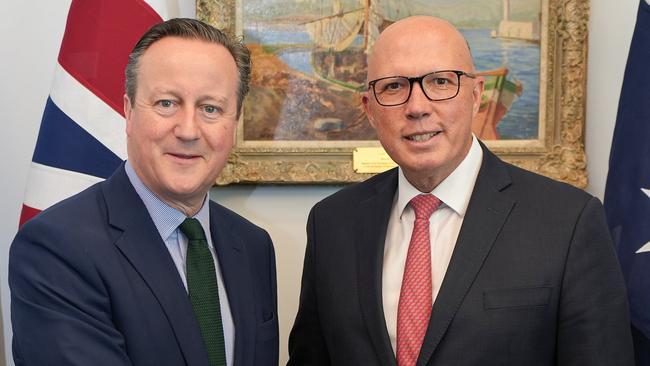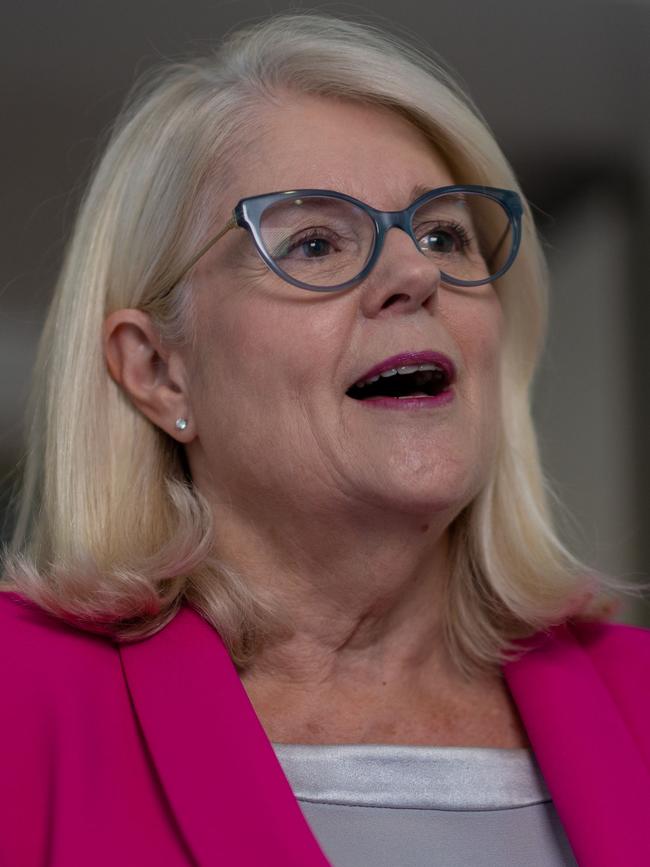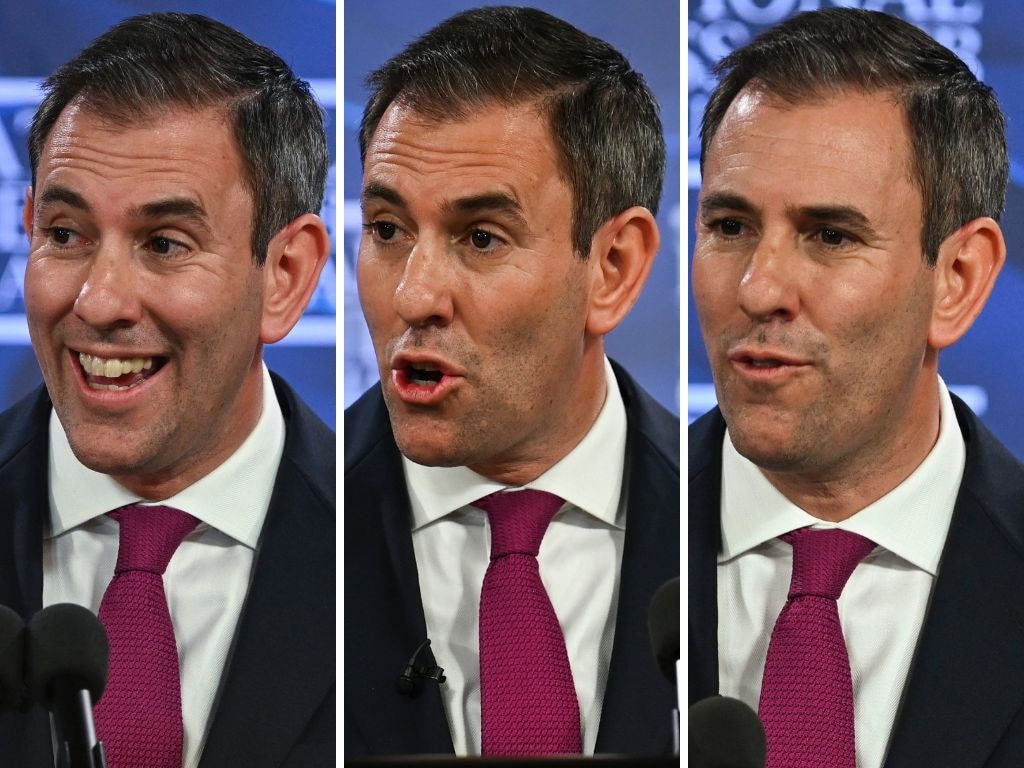Liberals tell Peter Dutton to embrace UK-style austerity
Jim Chalmers warns against austerity measures at a time of flat economic growth and high interest rates following calls by Liberal MPs for cost-cutting to lower ballooning structural deficits.

Jim Chalmers has warned against austerity measures at a time of flat economic growth and high interest rates, cautioning against a “slash and burn” budget approach following calls by Liberal MPs for cost-cutting to lower ballooning structural deficits.
After the Council of Financial Regulators released their quarterly statement on Tuesday, the Treasurer reissued his warning to maintain a careful approach to the budget.
The Council of Financial Regulators, which includes the Reserve Bank, ASIC, APRA and Treasury, met on Friday and discussed a concerning rise in the share of borrowers falling behind on their mortgage payments.
In response, Dr Chalmers said “higher interest rates are a key reason why people are under pressure and our economy is soft”.
“People are under the pump and that’s why our budget and our economic plan is all about easing cost of living pressures with tax cuts for every taxpayer and energy rebates for every household and for a million small businesses,” Dr Chalmers said.
“It would have been badly wrong to slash and burn in the budget when the economy is already very soft and people are hurting.
“The national accounts last week and today’s statement from financial regulators show our Budget strategy to deliver cost of living relief and fight inflation without smashing the economy was right.”
Peter Dutton is being urged by Coalition backbenchers and frontbenchers to take an ambitious cost-cutting plan to the election, with Liberal MPs promoting a David Cameron-inspired austerity program to slash ballooning structural deficits.
After national accounts figures last week showed public expenditure as a share of the economy had reached record levels outside the pandemic, The Australian can reveal a growing push inside Coalition ranks for a bold economic strategy that reins in budget spending and pushes back against unconditional state and territory government handouts.
Amid a government spending explosion in a high-inflationary environment, Liberal MPs and frontbenchers are encouraging the Opposition Leader to not be spooked by Joe Hockey’s 2014 “broken promises” budget.
Linking high government spending with “unequal distribution of pain” for Australian households, Queensland-based colleagues of Mr Dutton have called for greater accountability around the hundreds of billions of dollars pouring into state coffers.
With the Albanese government authorising massive health, education, NDIS and infrastructure funding for states and territories, Liberal MPs Garth Hamilton, Henry Pike and Karen Andrews want tougher measures to lower debt and spending.
The call to action comes as leading economists warned the nation was “sleep walking” towards a situation where the burden of paying for increasingly generous spending promises will fall on a shrinking share of working-age Australians, even as families struggle to afford housing.
Opposition Treasury spokesman Angus Taylor is preparing a Coalition economic election policy that would put more money into the pockets of Australians by combating bracket creep while delivering a better bottom line than Treasurer Jim Chalmers. Mr Taylor has avoided the use of the word “austerity” and said the Coalition was focused on “restraint”. Amid rising speculation of an early election, Dr Chalmers and Anthony Albanese have warned voters against an “austerity” approach. The Treasurer recently said “this is not the time for scorched earth austerity”.
Mr Hamilton, who is deputy chair of the standing committee on economics, said “we underestimate the electorates’ capacity for understanding economics”.
“If you accept there is money going into something without an increased service, then you must also accept that money can come out without a decreased service. The Australian people will be no worse off from the bureaucrats and cottage industries – that seem to be sopping up so much government money – having the taps turned off,” the Groom MP said.
Data points to a new era of ever greater government intervention in the economy, even as policymakers fret over stalling productivity growth that threatens to hurt future generations’ living standards.
Public spending on both services and infrastructure across the commonwealth and states is running at 27.7 per cent of national nominal GDP, shy of the 29.3 per cent peak in mid-2020 at the height of the Covid-19 fiscal response to devastating lockdowns, but well above the 25 per cent five-year average leading into the health crisis.
Public expenditure just on recurring government services has reached a record 22.2 per cent.
Westpac senior economist Pat Bustamante said while the Albanese government was striving to rein in major cost blowouts, such as reforming the NDIS and moving towards user-pay models for aged care, it had also moved in other areas such as childcare towards more universal provision of subsidies, regardless of family income or need.
While the budget forecasts the structural deficit dwindling to near zero over the coming decade, Mr Bustamante said “that’s all due to bracket creep”.
“If you take a step back, one of the reasons things haven’t come to a head is that commodity prices have delivered this windfall, and that has allowed us to kick the can down the road” when it comes to structural budget repair, he said.
“At the moment we are sleep walking towards a smaller and smaller subset of workers paying for services.”
Independent economist Chris Richardson said the tax take from soaring prices for key exports such as iron ore, coal and gas was so large that returning the booming terms of trade back to historical levels would rip $100bn out of the budget.
“You don’t need to repair it (the structural budget position) tomorrow, but you do want to do better over time,” Mr Richardson said.

Mr Hamilton called for action on “obvious Labor sinkholes”, including quantum computing and multi-billion dollar subsidies for renewables and solar panels, but said the big target lay in holding the states to their “constitutional responsibilities”.
“We’ve got constant issues around GP shortages, we’ve got money thrown towards emergency care clinics, we’ve got hospital ramping in a time where we’ve got record levels of funding to states. I can say the same thing about education, the money is going there without result.”
Mr Hamilton, who lived in Britain ahead of Lord Cameron’s 2010 election victory, said the former Conservative Party leader brought people with him on his commitment to significantly reduce government spending following the global financial crisis and the governments of Labour’s Tony Blair and Gordon Brown.
“He is a compassionate guy, you felt that this wasn’t Toryism, this wasn’t Thatcherism, this was a genuine, compassionate approach to deal with the problems of the day,” he said.
“This isn’t just a Liberal Party view. The last government that reduced spending as a percentage of GDP for three years in a row was Hawke and Keating. They were able to see the moral case for reducing spending too. This isn’t just a partisan position.
“Jim Chalmers is not Keating … he is a Blair.”
Mr Pike said there was an attitude among the Coalition backbench that “we need to be thinking long-term” about reducing spending and be upfront with voters about “our plan to grow the economy, boost productivity and remove the structural deficit”.
“We need to re-look at the thought that having a bit of austerity or cutting back on government services or waste are unpopular. I think David Cameron demonstrated it well that you can be promising that you’re going to bring things into line and look after the best long-term interests of the country,” the Bowman MP said. “We could definitely make an argument that trying to eat into the structural deficit and try to actually change that and be bold about cutting some things that need to be cut, I would be very happy to take that to the election. Where I would start is everything that we’re paying for that is a state government responsibility.
“The argument I would make is I find it actually quite immoral that we just run up debt the way that we do without any regard for the next generation of Australians who are going to be facing a bigger demographic challenge, particularly if we’re heading into a smaller migration future.”
Ms Andrews, a former cabinet minister who is retiring from politics at the next election, said “it is incumbent on all governments to make sure there is value for taxpayers’ dollars and it shouldn’t just be a mad spending spree that governments go on”.
The former industry and home affairs minister said “for every transport infrastructure project, you have state governments putting their hands out saying, well, federal government, you need to pay for this”.
“Something needs to be done on the spending on transport infrastructure where it’s, a) not good value for taxpayers, and b) when there’s a serious escalation in the costs. The federal government needs to say no to the states’ demands when they can’t be justified,” the McPherson MP said.





To join the conversation, please log in. Don't have an account? Register
Join the conversation, you are commenting as Logout